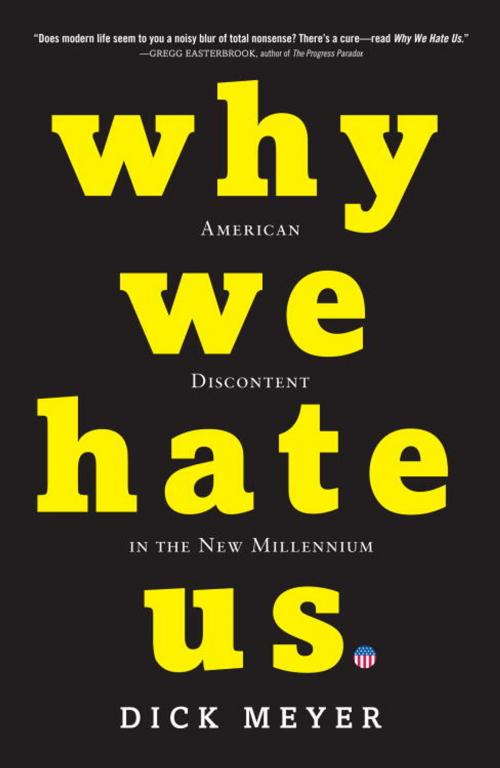Why We Hate Us
American Discontent in the New Millennium
Nonfiction, Social & Cultural Studies, Social Science, Cultural Studies, Popular Culture, Political Science| Author: | Dick Meyer | ISBN: | 9780307449801 |
| Publisher: | Crown/Archetype | Publication: | August 5, 2008 |
| Imprint: | Crown | Language: | English |
| Author: | Dick Meyer |
| ISBN: | 9780307449801 |
| Publisher: | Crown/Archetype |
| Publication: | August 5, 2008 |
| Imprint: | Crown |
| Language: | English |
Americans are as safe, well fed, securely sheltered, long-lived, free, and healthy as any human beings who have ever lived on the planet. But we are down on America. So why do we hate us? According to Dick Meyer, the following items on this (much abbreviated) list are some of the contributors to our deep disenchantment with our own culture:
Cell-phone talkers broadcasting the intimate details of their lives in public spaces
Worship of self-awareness, self-realization, and self-fulfillment
T-shirts that read, “Eat Me”
Facebook, MySpace, and kids being taught to market themselves
High-level cheating in business and sports
Reality television and the cosmetic surgery boom
Multinational corporations that claim, “We care about you.”
The decline of organic communities
A line of cosmetics called “S.L.U.T.”
The phony red state–blue state divide
The penetration of OmniMarketing into OmniMedia and the insinuation of both into every facet of our lives
You undoubtedly could add to the list with hardly a moment’s thought. In Why We Hate Us, Meyer absolutely nails America’s early-twenty-first-century mood disorder. He points out the most widespread carriers of the why-we-hate-us germs, including the belligerence of partisan politics that perverts our democracy, the decline of once common manners, the vulgarity of Hollywood entertainment, the superficiality and untrustworthiness of the news media, the cult of celebrity, and the disappearance of authentic neighborhoods and voluntary organizations (the kind that have actual meetings where one can hobnob instead of just clicking in an online contribution).
Meyer argues—with biting wit and observations that make you want to shout, “Yes! I hate that too!”—that when the social, spiritual, and political turmoil that followed the sixties collided with the technological and media revolution at the turn of the century, something inside us hit overload. American culture no longer reflects our own values. As a result, we are now morally and existentially tired, disoriented, anchorless, and defensive. We hate us and we wonder why.
Why We Hate Us reveals why we do and also offers a thoughtful and uplifting prescription for breaking out of our current morass and learning how to hate us less. It is a penetrating but always accessible Culture of Narcissism for a new generation, and it carries forward ideas that resounded with readers in bestsellers such as On Bullshit and Bowling Alone.
Americans are as safe, well fed, securely sheltered, long-lived, free, and healthy as any human beings who have ever lived on the planet. But we are down on America. So why do we hate us? According to Dick Meyer, the following items on this (much abbreviated) list are some of the contributors to our deep disenchantment with our own culture:
Cell-phone talkers broadcasting the intimate details of their lives in public spaces
Worship of self-awareness, self-realization, and self-fulfillment
T-shirts that read, “Eat Me”
Facebook, MySpace, and kids being taught to market themselves
High-level cheating in business and sports
Reality television and the cosmetic surgery boom
Multinational corporations that claim, “We care about you.”
The decline of organic communities
A line of cosmetics called “S.L.U.T.”
The phony red state–blue state divide
The penetration of OmniMarketing into OmniMedia and the insinuation of both into every facet of our lives
You undoubtedly could add to the list with hardly a moment’s thought. In Why We Hate Us, Meyer absolutely nails America’s early-twenty-first-century mood disorder. He points out the most widespread carriers of the why-we-hate-us germs, including the belligerence of partisan politics that perverts our democracy, the decline of once common manners, the vulgarity of Hollywood entertainment, the superficiality and untrustworthiness of the news media, the cult of celebrity, and the disappearance of authentic neighborhoods and voluntary organizations (the kind that have actual meetings where one can hobnob instead of just clicking in an online contribution).
Meyer argues—with biting wit and observations that make you want to shout, “Yes! I hate that too!”—that when the social, spiritual, and political turmoil that followed the sixties collided with the technological and media revolution at the turn of the century, something inside us hit overload. American culture no longer reflects our own values. As a result, we are now morally and existentially tired, disoriented, anchorless, and defensive. We hate us and we wonder why.
Why We Hate Us reveals why we do and also offers a thoughtful and uplifting prescription for breaking out of our current morass and learning how to hate us less. It is a penetrating but always accessible Culture of Narcissism for a new generation, and it carries forward ideas that resounded with readers in bestsellers such as On Bullshit and Bowling Alone.















